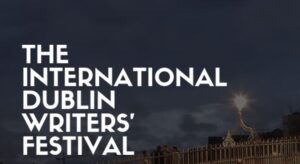Apr 17, 2024 | Editors' Blog, Interviews
Today, we’re talking with Douglas Buckland about his book, Good Friends Are Hard To Come By: An action adventure thriller for men (The Unintended Series Book 1).
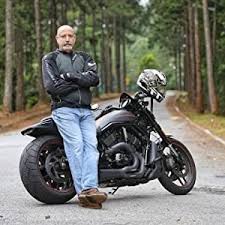 Tell us something unexpected about yourself!
Tell us something unexpected about yourself!
In the past I’ve held 3 Liberian shipping tickets; Able Bodied Seaman, Survival Craft Crewman and Oiler.
Why do you write?
I have always read voraciously, so during the Covid lockdowns I decided to try writing.
Where did you get the inspiration for your current book?
I grew up in Colorado working on cars and hunting, so this gave me a basis for my characters. During my career in the oilfield, I traveled extensively which opened up many other options for locations. I try to be as accurate as possible with my locations, so actually living and working in these places was helpful.
What do you enjoy the most about your genre?
The ability to be creative and to use my imagination. I also enjoy the ability to interject come laughs and comedy into the tense situations or the relationships that my characters find themselves in.
How would you describe your writing process?
Structured. I like to come up with a storyline in my mind, then outline it ‘on paper’. I call the outline the skeleton that I will hang the meat of the story on as I write.
What do you think authors have to gain from participating in social media?
I’ll be 64 soon and I am not really an aficionado of social media. I do interact with some writer’s pages and exchange ideas with a few select authors on them, but I find many authors who post on social media ask for advice or criticism, but when they receive it they either ignore it or simply can not take criticism.
What advice would you have for other writers?
To take writing seriously. It seems to me that many new authors feel that they can just sit down in front of their laptop and hammer out a novel. They do not realize that it is a long, involved process which takes a lot of research and discipline.
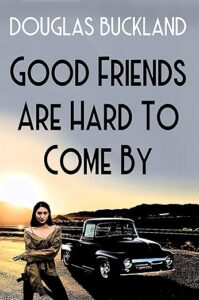 How do you select your books’ titles and covers?
How do you select your books’ titles and covers?
I always create the title and the cover from something that occurs in the novel. I think this is important and a duty to your prospective readers. The cover, the title and the ‘back blurb’ must reflect the book as accurately as possible. I’ll come up with a few ideas for the covers and the titles and send them to my publisher. She is a very clever person and a more experienced author as well. She’ll shoot some of my ideas down while offering her suggestions. It is an iterative process that seems to work well for us.
What’s your next step?
I’ll keep writing, but I need to become more knowledgeable and active concerning the marketing of my books.
What book do you wish you’d written?
The Loo Sanction by Trevanian, or anything by Janet Evanovich.
How do you react to seeing a new review for your book?
I enjoy it, good or bad. Everyone likes to see the good reviews and it makes you feel that your efforts are not wasted. On the other hand, the negative reviews tend to show you where you can improve.
FIND DOUGLAS’ BOOK ON AMAZON
Apr 16, 2024 | Editors' Blog, Interviews
Today, we’re talking with J.G. Harlond about her book, Secret Meetings: A Bob Robbins Home Front Mystery.
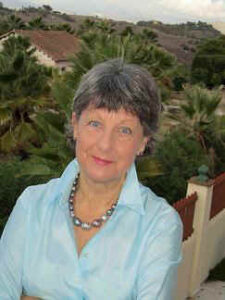 Tell us something unexpected about yourself!
Tell us something unexpected about yourself!
I’ve hang-glided off Mont Blanc, and bred and trained Spanish horses.
Why do you write?
Some people play the piano; I write. For many years I wrote text books, then moved on to fiction. I now apply my work-day discipline and research skills to something more creative but no less demanding.
Where did you get the inspiration for your current book?
After years of reading quality historical fiction, spy stories and classic crime, I began writing novels that included an element of each.
What do you enjoy the most about your genre?
Historical crime fiction requires serious background reading and research: I love it when I find something unexpected or little-known that would make a cracking story.
How would you describe your writing process?
I treat my writing like a normal job: I work at a desk and don’t cut corners at the editing stage. I grew up hearing ‘If a job’s worth doing, it’s worth doing well.’
What do you think authors have to gain from participating in social media?
Being an author can be lonely at times, and few people understand the hard work that goes into fiction, so it has been lovely to meet like-minded souls on-line. Fellow authors are also very supportive in the main; ‘sharing’ and ‘liking’ helps a lot in the current over-crowded book market.
What advice would you have for other writers?
Get started, stay focused, get finished. Always use a professional editor. Don’t settle for second best in anything.
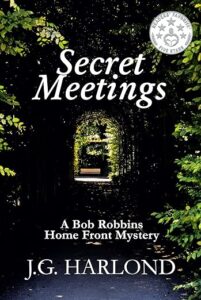 How do you select your books’ titles and covers?
How do you select your books’ titles and covers?
I try out different titles with my beta readers (who are also authors). My self-published covers are by professional designers, who are willing to listen and tweak until we are both satisfied. I have almost no control over my traditionally published covers.
What’s your next step?
I’m on the third draft of a new hist-fic novel, and the next Bob Robbins Home Front Mystery is at the thinking and planning stage in a bright new notebook.
What book do you wish you’d written?
Niccolò Rising by Dorothy Dunnett.
How do you react to seeing a new review for your book?
Usually thrilled, sometimes astonished. Reviews generally say more about the reviewer than the book they (may not) have read.
FIND J.G. HARLOND’S BOOK ON AMAZON
VISIT J.G. HARLOND’S WEBSITE
Apr 16, 2024 | Editors' Blog, Interviews
Today, we’re talking with Jacqueline Johnson about her book, Women and Gut Health: Stop Living In Silence, Suffering, And Stigmas With Your Gastrointestinal Issues And Plan For Improved, Sympton Free Digestion And Overall Wellbeing.
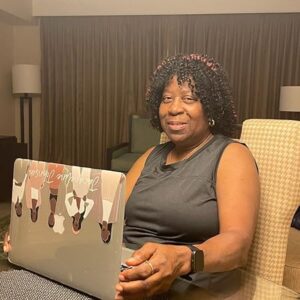 Tell us something unexpected about yourself!
Tell us something unexpected about yourself!
At the retirement stage of life though not retired, continue to love what I do—40 plus Nursing career.
Why do you write?
Writing was a way I could use what I know from my nursing experience to help people.
Where did you get the inspiration for your current book?
Inspiration came from observations in day surgery where I currently work. More women were coming in for gut issues than men.
What do you enjoy the most about your genre?
It allows you to share information, educate/teach, allow/provide feedback.
How would you describe your writing process?
Under the publishing platform I was in keeping to tasks and not giving up was highly emphasized. I followed everything to the letter in spite of not being tech savvy. Any challenges I would seek help from support coach, family/friend. I took my time writing to ensure everything was proper.
What do you think authors have to gain from participating in social media?
More awareness of your book resulting in more book sales.
What advice would you have for other writers?
Never give up on your goal of having something to say through writing.
 How do you select your books’ titles and covers?
How do you select your books’ titles and covers?
Book title was selected from categories/genres of books already listed in Amazon. Your book title had to be unique from other books in your same genre. I used a paid service to come with a book design and a contest to see which book cover would be most popular.
What’s your next step?
Keep promoting/advertising my book.
How do you react to seeing a new review for your book?
Happy because it adds to social proof for my book.
FIND JACQUELINE’S BOOK ON AMAZON
Apr 16, 2024 | Editors' Blog, Interviews
Today, we’re talking with Santi Limonche about his book, The Staff of Karanos: an epic fantasy adventure.
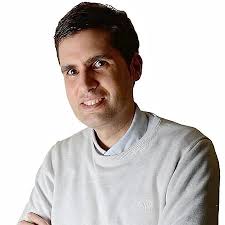 Tell us something unexpected about yourself!
Tell us something unexpected about yourself!
I studied mathematics at university and my hobby is to study ancient Greek and Latin with my aunt (a retired high school professor).
Why do you write?
One morning, a few years ago, I woke up with the need to write and it was getting stronger and stronger. So, I got down to it. In three weeks I planned the architecture of my first novel and in four months I wrote the first draft. Since then, I have learned to enjoy the process of writing after taking courses in narrative techniques.
Where did you get the inspiration for your current book?
Undoubtedly: the muses. They have received many names over the centuries. Inspiration guides you and whispers what you should write. It helps me to listen to classical or epic music, depending on my mood.
What do you enjoy the most about your genre?
Fantasy allows you to escape from reality, while at the same time reflecting the same problems that happen in the real world. Also, it is true that magic can be seen with the phrase that Arthur C. Clarke said: “Any sufficiently advanced technology is indistinguishable from magic”.
How would you describe your writing process?
First I sketch a brief outline of the skeleton of the novel and then I start writing. You could say I’m a cross between a writer-architect and a gardener: not much planning, but I don’t leave everything to chance either. And if something struggles, I start with another scene. And, very importantly, I write every day.
What do you think authors have to gain from participating in social media?
I believe that there are as many paths as there are writers. If social networks work for them, I’m happy for them. The hard part is finding the perfect path for us. It has been said so many times that what works for one person, doesn’t work for another…
What advice would you have for other writers?
Don’t be afraid to write and don’t think about what others will say. Comparisons do not help. Also, I recommend sitting down to write every day, even if it’s just a paragraph. You have to look for the muses!
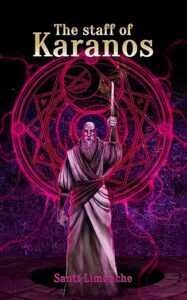 How do you select your books’ titles and covers?
How do you select your books’ titles and covers?
The title came to mind when I wrote the last word of the first draft of the novel. Up to that time, it was simply “novel”. However, for the prequel, I already had a clear title about the origin of the bimbairi before I started writing.
What’s your next step?
Writing the sequel to The Staff of Karanos. I have some ideas to explain the origin of the bimbairi thanks to a question a friend asked me.
What book do you wish you had written?
Good question… There are so many good writers and wonderful books out there that it’s hard to choose. My heart is torn between Lord of the Rings and Don Quixote.
How do you react to seeing a new review for your book?
I react with gratitude and joy upon receiving a new review. Although, my aspiration would be if I could get someone hooked on literature like I am. I think there is the perfect book for everyone: I found it with “…en un lugar llamado Tierra” by Jordi Sierra i Fabra. Literature has given me so much that I would like to give something back.
VISIT SANTI’S WEBSITE
FIND SANTI’S BOOK ON AMAZON
Apr 16, 2024 | Editors' Blog, Interviews
Today, we’re talking with Jeff Burlingame about his book, George Varnell: The Life and Times of a Pioneering Sportsman.
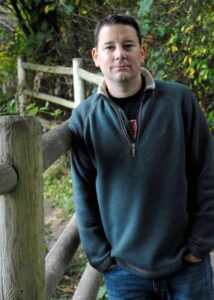 Tell us something unexpected about yourself!
Tell us something unexpected about yourself!
My books have twice been featured as questions on Jeopardy!
Why do you write?
To share stories about unique and interesting people, places, and things.
Where did you get the inspiration for your current book?
From the subject’s family. It also involves Gonzaga University’s successful basketball team (George Varnell was their first-ever coach), The Boys in the Boat (George Varnell was like a member of their squad), and the Olympics (George Varnell was a competitor in two events). He was one well-known person that I had never heard of until I spoke with his family.
What do you enjoy the most about your genre?
That truth (nonfiction) can be just as interesting as fiction, or even more so, if done properly.
How would you describe your writing process?
Research, sketch, edit. Repeat.
What do you think authors have to gain from participating in social media?
They can discover an audience of like-minded individuals.
What advice would you have for other writers?
Be sure that at its core, you’re writing for the right reason… and that right reason is not any potential monetary gain.
How do you select your books’ titles and covers?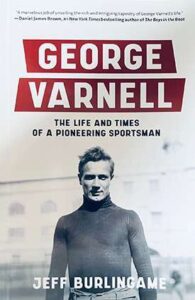
I have been fortunate enough that all my publishers have allowed me to have at least some creative input in the cover-selection process. Some more than others, but I’ve always had a say. I love working with talented designers to see what they come up with.
What’s your next step?
I am working on writing and publishing my next book. That’s something I’ve fortunately been able to say for almost 20 years now since my first one was published.
What book do you wish you had written?
The River Why by David James Duncan.
How do you react to seeing a new review for your book?
I’m glad someone read it and felt strongly enough to form a written opinion… good or bad (but mostly good!).
VISIT JEFF’S WEBSITE
FIND JEFF’S BOOK ON AMAZON
Apr 16, 2024 | Editors' Blog, Interviews
Today, we’re talking with M.J. Polelle about his book, The Mithras Conspiracy.
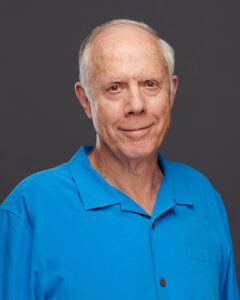 Tell us something unexpected about yourself!
Tell us something unexpected about yourself!
I’m a former law professor turned novelist in my “second act” of life.
Why do you write?
To be a creator who sets characters loose in the world around me.
Where did you get the inspiration for your current book?
Reading The Da Vinci Code and soon after spending a honeymoon in Italy.
What do you enjoy the most about your genre?
It forces me to write plot and engage actively with issues in the world.
How would you describe your writing process?
Rhythmic. I don’t believe in daily word counts or obsessive rituals.
What do you think authors have to gain from participating in social media?
Not much. It drains time and energy from the creative task. Writers write, something different from social media.
What advice would you have for other writers?
If you write to fulfill an inner urge, you’ll keep going no matter the headwinds.
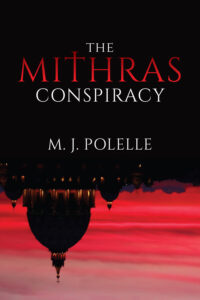 How do you select your books’ titles and covers?
How do you select your books’ titles and covers?
Carefully.
What’s your next step?
Over cappuccinos, I’m thinking of another thriller novel involving southwest Florida where I live.
What book do you wish you had written?
Farewell to Arms.
How do you react to seeing a new review for your book?
Depends on the review. If the reviewer “gets it,” I’m delighted. If there’s a criticism, I try to learn from it if I think it’s valid.
VISIT M.J.’S WEBSITE
FIND M.J.’S BOOK ON AMAZON
 Tell us something unexpected about yourself!
Tell us something unexpected about yourself! How do you select your books’ titles and covers?
How do you select your books’ titles and covers?
 Tell us something unexpected about yourself!
Tell us something unexpected about yourself! How do you select your books’ titles and covers?
How do you select your books’ titles and covers? Tell us something unexpected about yourself!
Tell us something unexpected about yourself! How do you select your books’ titles and covers?
How do you select your books’ titles and covers? Tell us something unexpected about yourself!
Tell us something unexpected about yourself! How do you select your books’ titles and covers?
How do you select your books’ titles and covers? Tell us something unexpected about yourself!
Tell us something unexpected about yourself!
 Tell us something unexpected about yourself!
Tell us something unexpected about yourself! How do you select your books’ titles and covers?
How do you select your books’ titles and covers?
